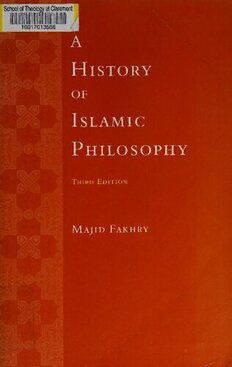
A History Of Islamic Philosophy PDF
Preview A History Of Islamic Philosophy
THN 13 A HISTORY OF ISLAMIC PHILOSOPHY THIRD EDITION Mayjip FAKHRY @ The Library of the CLAREMONT SCHOOL OF THEOLOGY 1325 North College Avenue Claremont, CA 91711-3199 1/800-626-7820 A History of Islamic Philosophy Lia a : SRAREMONaT i 4 » © ; Lm, wiePnA ,as ar uia ee—eate e ri ey — Ll ey _ An7 i ] wpe Aves, wit ry 22° oe re a = A, as 1\ Fa 2004 A History of Islamic Philosophy Third Edition Majid Fakhry COLUMBIA UN TaVRESIOTERT AY | (PORMEGSSS IN HOW WeYGO RK wy COLUMBIA UNIVERSITY PRESS Publishers Since 1893 New York Chichester, West Sussex Copyright © 1970, 1983, 2004 Columbia University Press All rights reserved Library of Congress Cataloging-in-Publication Data Fakhry, Majid. A history of Islamic philosophy / Majid Fakhry3—r d ed. p. cm. Includes bibliographical references (p. ) and index. ISBN 0-231-13220-4 (cloth : alk. paper) —ISBN 0-231-13221-2 (pbk. : alk. paper) 1. Philosophy, Isla—m Hiistocry . I. Title. B741.F23 2004 181'07 —de22 2004051978 Columbia University Press books are printed on permanent and durable acid-free paper. Printed in the United States of America COO Ga O air. Foe am AN 2s a p, 10 00 8 7 Oss 42 Theology Library CLAREMONT OF THEOLOGY scHOOL Claremont, CA Contents Preface to the First Edition ix Preface to the Second Edition xiii Preface to the Third Edition xv Introduction xvii ONE. ‘The Legacy of Greece, Alexandria, and the Orient 1 I. The Near Eastern Scene in the Seventh Century 1 Il. The Translations of Philosophical Texts 4 III. Pre-Socratics, Peripatetics, and Stoics 19 IV. Neo-Platonic Elements: The Apocryphal Theologia Aristotelis and the Liber de Causis 21 V. Persian and Indian Influences 33 Two. Early Political and Religious Tensions 39 I. The Religio-Political Factions 39 II. The Rise of Islamic Scholasticism (Kalam) 43 THREE. Beginnings of Systematic Philosophical Writing in the Ninth Century 67 I. The First Systematic Philosophical Writer in Islam: Al-Kindi 67° II. The Rise of Naturalism and the Challenge to Islamic Dogma: Ibn Al-Rawandi and Al-Razi_ 95 al CONTENTS III. The Progress of Free Thought and Religious Heterodoxy 106 FouR. The Further Development of Islamic Neo-Platonism 111 I. Al-Farabr in [ie ibm Sina “132 FIVE. Neo-Pythagoreanism and the Popularization of the Philosophical Sciences 167 I. Philosophy, the Handmaid of Politics 167 Il. The Mathematico-Philosophical Presuppositions of the Brethren 170 II. The Cosmology and Metaphysics of the Brethren 175 IV. The Psychology and the Epistemology of the Brethren 179 V. Conclusion 183 six. The Diffusion of Philosophical Culture in the Tenth Century 187 I. Aba Hayyan Al-Tauhidi 187 II. Miskawayh 191 III. Yahia b. ‘Adit 197 SEVEN. ‘The Interaction of Philosophy and Dogma 209 I. The Eclipse of Theological Rationalism 209 II. The Ash‘arite School and the Formulation of the Occasionalist Metaphysics of Atoms and Accidents 215 III. The Systematic Refutation of Neo-Platonism: Al-Ghazali 223 EIGHT. ‘The Rise and Development of Islamic Mysticism (Stfism) 241 I. Ascetic Origins 241 II. Pantheistic Tendencies: Al-Bastami (or Al-Bistami), Al-Hallaj, and Others 248 III. Synthesis and Systematization—Al-Ghazalt and [bn ‘Arabi 253 IV. Rumi, Supreme Mystical Poet 262 V. Sufi Orders: Stfism Today 264 CONTENTS Vil NINE. ‘The Arab-Spanish Interlude and the Revival of Peripateticism 267 I. Beginnings of Philosophical Speculation in Muslim Spain: Ibn Masarrah, Al-Majriti, and Ibn Bajjah 267 II. Ibn Tufayl and the Natural Progression of the Mind Toward Truth 273 III. Ibn Rushd and the Defense of Aristotelianism 280 TEN. Post-Avicennian Developments: Illumination and the Reaction against Peripateticism 303 [. Al-Suhrawardi 303 Il. The Subsequent Development of Iluminationism: Sadr Al-Din Al-Shirazi (Mulla Sadra) and His Successors 314 Ill. The Continuity of the Ishraqi Tradition in Persia 321 ELEVEN. ‘Theological Reaction and Reconstruction 323 I. Literalism and Neo-Hanbalism: Ibn Hazm, Ibn Taymiyah, and Muhammad B. ‘Abdul-Wahhab 323 Il. Moderation and Decline: F. D. Al-Razi, N. D. Al-Nasafi, Al-Iji, Al-Jurjani, and Al-Bajuri 329 III. Reaction and Reconstruction: Ibn Khaldtin 334 TWELVE. Modernist Trends 345 I. The Emergence of the Modernist Spirit: J. D. Al-Afghani and Muhammad ‘Abdu 345 II. Islamic Philosophy in India and Southeast Asia 359 III. Modernism in India: Sayyid Ahmad Khan, Ameer Ali, and Muhammad Iqbal 360 THIRTEEN. Contemporary Trends 369 I. Liberalism, Secularism, and Fundamentalism 369 II. Existentialism, Positivism, and Marxism 385 III. Postmodernism and Hermeneutics 396 Bibliography 399 Index 411 Digitized by the Internet Archive in 2021 with funding from Kahle/Austin Foundation https://archive.org/details/historyofislamicO000fakh_k1c5
